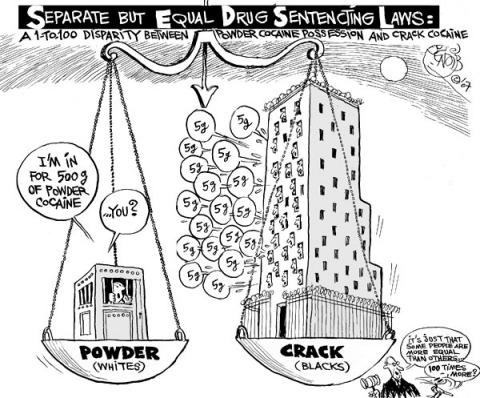Slashing Racist Crack Sentences Has Already Saved 16K Prison Years And Half A Billion Dollars
In 2010, Congress mitigated a blight on the U.S. justice system by reducing a racist drug sentencing disparity. Before the passage of the Fair Sentencing Act, crack offenses, which disproportionately ensnare African Americans, carried mandatory minimum sentences that were 100 times those for powder cocaine sentences, which are more often doled out to whites. In the compromise measure, Congress reduced that disparity to 18 to 1. While the law initially applied only to future sentences, the U.S. Sentencing Commission opted a year later to apply the new law to sentences retroactively.
Just two years later, the results of the Sentencing Commission’s action have been striking. More than 7,300 inmates convicted of crack offenses have received average 29-month sentence reductions, meaning a total of 16,000 years in prison saved, according to calculations on new U.S. Sentencing Commission data by sentencing expert Doug Berman. Eighty-five percent of those who received reduced sentences were black, and Berman points out that these average reduced sentences of ten years are still “significantly higher than the average sentence imposed for any other drug crime.” Still, these reductions have already saved the Bureau of Prisons half a billion dollars by conservative estimates. That is a big chunk of change for an agency whose total budget is $7 billion, and already exceeds initial Bureau of Prison estimates. Violent crime rates, meanwhile, have neared generational lows, in spite of alarmist warnings about dangerous criminals set loose.
But this is just the beginning of the impact of potential sentencing reform. For one thing, judges continue to consider petitions for reduced sentences, with the U.S. Sentencing Commission predicting it could take decades for all possible sentencing reductions to occur.
More significantly, the majority of inmates sentenced before 2010 are not even eligible for sentencing reductions, because they are serving mandatory minimum sentences that judges have absolutely no discretion to reduce. The U.S. Sentencing Commission change only affects the guidelines judges use to sentence offenders whose conviction was not subject to a mandatory minimum penalty, or perhaps who were sentenced to more than the mandatory minimum. For most other sentenced inmates, the old 100-to-1 sentencing scheme will remain in effect, absent a definitive court ruling or act of Congress declaring that the mandatory minimum sentence reduction is retroactive.
One federal appeals court panel held in May that the FSA’s reduction of mandatory minimum sentences should apply retroactively, not just because that was the intent of the 2010 Fair Sentencing Act, but because failure to do so would amount to unconstitutional, “intentional racial subjugation.” But in the likely event that this ruling does not survive a full panel review and/or appeal, a bipartisan bill introduced this week by Sens. Dick Durbin (D-IL) and Mike Lee (R-UT) would make that ruling the law of the land. This bill would also soften the overall impact of harsh mandatory minimum sentences by giving judges more discretion to reduce sentences. Another bipartisan proposal to mitigate mandatory minimum sentences has been introduced in both the House and Senate by different lawmakers. With judges, prosecutors, the Department of Justice and lawmakers from both parties now imploring reform of counterproductive mass incarceration policies, the primary remaining obstacle to at least incremental change may be congressional dysfunction.


Spread the word